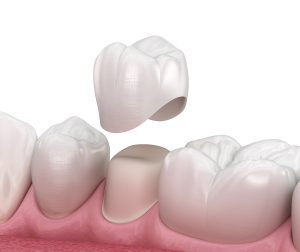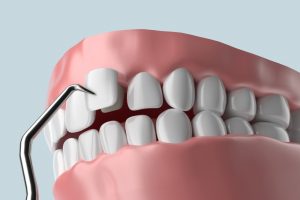

Which Dental Treatment is Best for You?
Every smile is unique and deserves personalized care. When it comes to enhancing your smile, there are two popular choices among patients: dental crowns and veneers. But what’s the difference, and which one is right for you? In this comprehensive comparison guide, our Staten Island dentists dive into the world of dental crowns versus veneers, exploring their features, benefits, and potential drawbacks.
Be prepared to make an informed decision about your dental makeover and begin your journey toward a brighter, confident smile!
Dental Crowns and Dental Veneers
What Are Dental Crowns?
Dental crowns, also known as caps, completely cover the tooth. They can be made from various materials such as porcelain-fused-to-metal, all-ceramic, or metal alloys. The choice of material depends on factors like strength requirements, aesthetic preferences, and the specific location of the tooth within the mouth.
The dental crown process involves reshaping the existing tooth by removing a portion of its outer structure. This is done to create sufficient space for the crown to fit over the tooth. Once the tooth is prepared, impressions are taken to create a custom-made crown that matches the shape, size, and color of the natural teeth.
What Are Dental Veneers?
Dental veneers are thin layers made from dental porcelain or composite resin. Unlike crowns, veneers are primarily used for improving the appearance of teeth rather than providing full coverage. They’re best suited for minor shape correction, closing gaps between teeth, or enhancing overall aesthetics.
Imagine you have a chipped front tooth that is otherwise healthy. In this case, a dentist may recommend a dental veneer rather than a crown because it requires less removal of tooth material during preparation. Veneers are crafted to blend seamlessly with your natural teeth, giving you a beautiful smile makeover.
Purpose
Dental crowns serve multiple purposes. They can:
- Strengthen weak or damaged teeth
- Restore teeth after root canal treatment
- Support dental bridges to replace missing teeth
- Cover dental implants
- Improve the appearance of misshapen or severely discolored teeth
Dental veneers can:
- Cover minor tooth imperfections like chips, cracks, or stains
- Address mild cases of tooth misalignment without requiring orthodontic treatment
 Types of Materials Used
Types of Materials Used
When creating dental crowns and veneers, various materials can be used. The material choice depends on factors such as durability, aesthetics, and the specific needs of each patient.
For dental crowns, one of the most popular types is porcelain-fused-to-metal (PFM). This type of crown combines the strength of metal with the natural-looking appearance of porcelain. PFM crowns are known for their durability and resistance to chipping or cracking. However, they may not be as aesthetically pleasing as all-porcelain crowns since a thin metal layer may be visible at the gum line.
Another material commonly used for dental crowns is zirconia. Zirconia crowns are prized for their exceptional strength and durability, making them an excellent option for molars or areas with heavy chewing forces. They’re highly resistant to fracturing and wear, providing long-lasting results. Additionally, zirconia crowns can closely mimic the translucency of natural teeth, ensuring an aesthetically pleasing smile.
For dental veneers, porcelain is the most popular material choice due to its ability to replicate the appearance of natural teeth. Porcelain veneers exhibit lifelike transparency and shine, effectively mimicking the characteristics of tooth enamel. They’re stain-resistant and offer a significant improvement in tooth color, shape, and overall aesthetics.
There are also options like composite resin veneers, which can be more affordable but may not match the longevity or aesthetic quality of porcelain. Composite resin veneers are made of a tooth-colored composite material that’s directly applied and shaped on the tooth surface. While they can be more cost-effective, they’re generally not as durable as porcelain veneers and may require replacement more frequently.
Costs and Insurance
When considering dental crowns vs. dental veneers, it’s crucial to evaluate the cost. Cost is often a deciding factor for many individuals seeking dental restorations.
For example, maybe you have a front tooth with a significant chip or crack that needs restoration. If you opt for a veneer, it may cost you around $500 to $1,100 per tooth. However, if you choose a crown instead, the average price range of $800 to $2,500 per tooth. Keep in mind that these costs can vary depending on factors such as location and dentist fees.
Most dental insurance plans cover a portion of the cost for necessary restorative treatments like crowns or veneers. However, it’s crucial to review your policy carefully to understand the extent of coverage and any limitations or waiting periods associated with these procedures.
For instance, some insurance plans may cover a higher percentage of dental crowns compared to veneers since crowns are often considered more medically necessary for extensive tooth damage or decay. This means you may be required to pay a larger out-of-pocket expense for veneers.
The Procedures
Understanding the dental procedures involved with each option is crucial to make the best choice.
Dental crowns generally require multiple appointments. The process typically involves tooth preparation, where the dentist reshapes the tooth to accommodate the crown. A mold is then taken to create a customized crown, which is fabricated in a dental lab. During the final appointment, the permanent crown is placed and adjusted for fit and bite.
Veneers usually require less tooth preparation. The dentist may need to remove a minimal amount of enamel from the front surface of the teeth to ensure proper adhesion. Impressions are taken, and temporary veneers may be placed while the final restorations are being crafted. Once ready, the veneers are bonded to the teeth during a follow-up appointment.
Pros and Cons of Choosing Dental Crowns or Veneers
Pros of Dental Crowns
- Durability: Made from materials such as porcelain, ceramic, or metal alloys, crowns are designed to withstand the forces of biting and chewing. They provide excellent long-term protection for weak or damaged teeth, preventing further deterioration.
- Versatility in addressing various dental issues: Dental crowns can be used to cover severely decayed or broken teeth, strengthen a tooth after a root canal treatment, restore functionality to worn-down teeth, or even enhance the appearance of misshapen or discolored teeth. With advancements in technology and materials, crowns can now closely mimic the natural look of teeth, providing aesthetically pleasing results.
Cons of Dental Crowns
- They require more preparation than veneers: To accommodate the crown, a significant portion of the tooth structure needs to be removed. This means that the tooth may become weaker and more susceptible to future damage.
- Multiple visits to the dentist: It usually requires two appointments — one for preparing and shaping the tooth and another for placing the permanent crown. It can be time-consuming and inconvenient for some individuals.
Pros of Dental Veneers
- Conservative approach to tooth restoration: Unlike crowns, veneers require minimal removal of tooth enamel since they’re thin shells placed over the front surface of teeth. This makes them a less invasive option that leaves most of the natural tooth intact.
- Can make cosmetic improvements: They effectively address issues like teeth discoloration, minor malalignment, gaps between teeth, or worn enamel. They offer a natural-looking solution that can give you the smile you desire without extensive dental work.
Cons of Dental Veneers
- Lifespan: While veneers can last anywhere from 10 to 15 years with proper care, they will eventually need replacement. You may need to undergo the process again in the future, which can be an additional cost and time commitment.
- Veneers may be more prone to chipping than crowns: Since veneers only cover one surface of the tooth, they’re more susceptible to damage from constant biting and chewing pressure. However, this can be avoided by practicing good oral hygiene and avoiding habits like teeth grinding or biting on hard objects.
 Schedule Your Cosmetic Dentistry Consultation Today!
Schedule Your Cosmetic Dentistry Consultation Today!
If you’re torn between dental crowns and dental veneers for improving your smile appearance, contact our Staten Island dentists today. By scheduling a cosmetic dentistry consultation, our dentists can evaluate your oral health and smile to help you make the best decision for your goals.



 Types of Materials Used
Types of Materials Used
 Schedule Your Cosmetic Dentistry Consultation Today!
Schedule Your Cosmetic Dentistry Consultation Today!